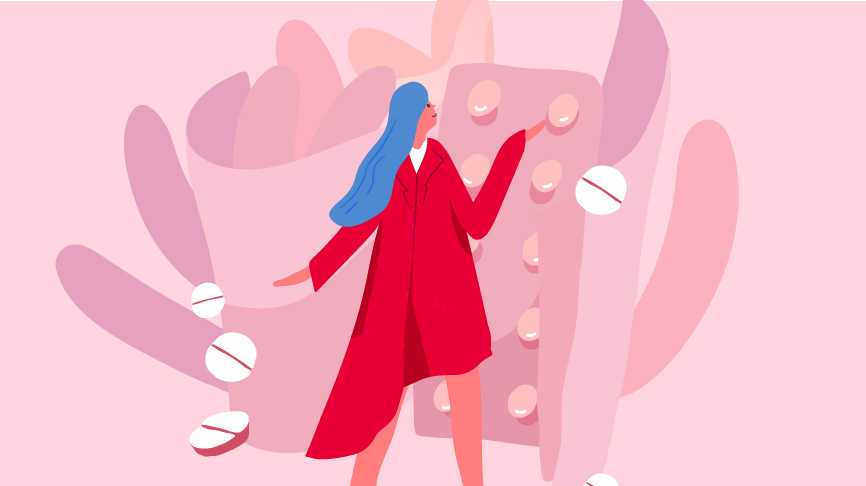Do I Need a Birth Control Cleanse? Getting off Hormonal Contraceptives

Modern forms of birth control revolutionized the world for women and people with uteruses.
It gave them more freedom over how they lived their lives, their career options, how they could navigate their sex lives, and when and how many children they wanted. Today in the U.S., an estimated twenty-five percent of women aged fifteen to forty-nine use some form of hormonal birth control.
Hormonal contraceptives have given sexually active humans options and choices. Unfortunately, they’re not perfect.
Many people experience side effects from hormonal birth control like weight gain, loss of libido, and in some cases – mental health issues like depression and anxiety.
At one point in another, everyone who is on HBC will have to go off of it, Whether that be because they’re experiencing side effects, or they’re hoping to conceive, or it’s just no longer right for them and their body.
With birth control being readily prescribed and used, many people don’t give much thought to the effects artificial hormones can have on the body.
What is a Birth Control Cleanse?
More and more people are starting to connect with their reproductive health with tools like tracking their menstrual cycle and becoming more mindful of their periods.
This rise of body awareness has people asking questions like:
“What are the long-term effects of hormonal birth control?”
“How long does it take for birth control to get out of your system?”
and…
“Is there a way to cleanse my body off birth control?”
A birth control cleanse is a method that is typically used by naturopathic or holistic doctors and practitioners to help a client’s body “detox” off the hormones that are in birth control. These are typically formulated with various vitamins, herbs, and minerals.
Let’s find out.
Do You Need to Do a Birth Control Cleanse?
No, you don’t need to do a birth control cleanse. Plenty of people go off of birth control, never do a cleanse, and go on to lead happy, healthy, and oftentimes, fertile, lives.
Sometimes a cleanse is promoted to support people with what’s called “post birth control syndrome”. This isn’t technically a disorder, but rather a set of symptoms that some people experience after going off hormonal contraception, typically the pill.
This term was coined by the thought-leading influencer, Dr. Aviva Romm, in her textbook “Botanical Medicine for Women’s Health.”
Most HBC work by suppressing ovulation, so that people can’t get pregnant. This is done through the use of artificial hormones. Many people go on birth control in the first place to help with things like acne, painful and irregular periods. Oftentimes people go on HBC as teens to help with these “issues”, which are usually just a normal part of being a teenager.
When people then go off HBC years later, these symptoms can arise again, much to their dismay.
Here are symptoms that people may experience going off birth control:
- Painful, irregular, or heavy periods
- Lack of period, or post-pill amenorrhea
- Difficulty conceiving
- Acne
- Hair loss
- Digestive problems
- Migraines
- Weight gain or loss
- Depression or anxiety
HBC may also disguise symptoms of PCOS and endometriosis, which then show up when you go off the medication.
As of now, there are no scientific studies backing up the use of birth control cleanses. Of course, despite how long people have been using hormonal contraceptives, there are very limited studies on the long-term effects of being on them. That being said, science isn’t always up to speed with people’s lived experiences, and many people do benefit from some kind of birth control cleanse.
Post Birth Control Tips
Even if you don’t do a birth control cleanse per se, there are other things you can do to support your body when you go off HBC.
- Supplements: Like zinc, magnesium, folic acid, B vitamins, and vitamin E, which HBC may deplete in the body.
- Balanced Diet: Eating a nutrient-rich diet full of healthy fats, fiber, micronutrients, and probiotic-rich fermented foods.
- Getting Plenty of Sleep: Avoid screen time before bed, and try to spend time in the sun when you can.
- Acne medication: If this is one of your main symptoms, you can treat it through skincare changes, and seeing a dermatologist if necessary.
- Give it time: Sometimes it’s just a matter of time before these symptoms subside. It can take anywhere from a few weeks to a few months for your cycle to return to normal, and for symptoms to subside. Post-HBC symptoms might take even longer to show up and then to go away.
When to See a Doctor
If it’s been three to six months since you’ve gone off HBC, and you still haven’t gotten your period, you may want to see a doctor.
If you’re hoping to get pregnant, it can be helpful to see one anyways to get a thorough blood panel and see where your hormones are at, if you have any vitamin or mineral deficiencies, or anything else that may be helpful on your fertility journey.
It’s also wise to see a healthcare provider if you’re experiencing symptoms of reproductive health issues like PCOS and endometriosis.
In rare cases, your doctor may suggest hormonal medication to help with severe symptoms.
Going off birth control is a big step. Keep following your body’s intuition, and enjoy the journey of getting to know your cycle in a whole new way.

Natasha (she/her) is a full-spectrum doula and health+wellness copywriter. Her work focuses on deconstructing the shame, stigma, and barriers people carry around birth, sex, health, and beyond, to help people navigate through their lives with more education and empowerment. You can connect with Natasha on IG @natasha.s.weiss.


